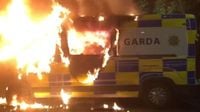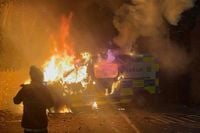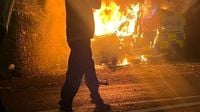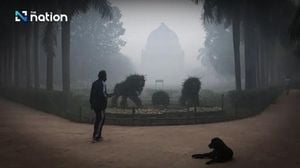On the evening of October 21, 2025, the usually quiet suburb of Saggart, southwest of Dublin, was transformed into a scene of chaos and confrontation, as thousands gathered outside the Citywest Hotel—a facility currently housing asylum seekers. What began as a protest over an alleged sexual assault in the area quickly spiraled into violence, marking one of the most significant public disturbances Ireland has seen in recent years.
According to multiple reports, including those from AFP, BBC, and Sky News, the unrest erupted after local media revealed that a 10-year-old girl had allegedly been sexually assaulted nearby in the early hours of October 20. The accused, a 26-year-old man, was reported to be an asylum seeker and had appeared in court earlier on the day of the protest. The alleged victim, who was in state care, had gone missing during a supervised trip to Dublin’s city centre, as confirmed by the child and family agency Tusla.
By Tuesday night, the area outside the Citywest Hotel was packed with between 1,000 and 2,000 protesters, many waving Irish flags, their faces obscured by hoods and scarves. Chants of “get them out” filled the air as the crowd’s anger intensified. Some protesters threw bricks, glass bottles, and fireworks at the Gardaí, Ireland’s national police force, while others attempted to breach police lines using horse-drawn sulkies and makeshift weapons like garden forks. The escalation was palpable; one youth was even seen smashing a police van’s windscreen with a hammer, and the van was subsequently set on fire, according to Metro and BBC.
Garda Commissioner Justin Kelly, addressing the aftermath, did not mince words: “This was obviously not a peaceful protest. The actions this evening can only be described as thuggery. This was a mob intent on violence against Gardaí.” He added, “We will now begin the process of identifying those who committed crimes and we will bring those involved in this violence to justice.”
Police responded with significant force, deploying about 300 officers—half from the public order unit—alongside officers on horseback and dog units. For the first time, the Gardaí used their newly acquired water cannon, purchased after riots in Dublin city centre two years earlier. A police helicopter circling overhead became another target, with protesters aiming lasers at its cockpit in an attempt to disrupt police operations. Despite the scale of the violence, only one officer was reported injured, requiring medical attention for a foot injury, and there were no reports of civilian injuries at the time of reporting.
As the night wore on, the situation grew increasingly tense. Police lines held firm, preventing the crowd from reaching the hotel itself, which continued to serve as accommodation for people seeking international protection. Around 9:30pm, officers began moving towards the remaining protesters, resulting in a standoff. Those who refused to disperse were pepper-sprayed. Gradually, the protest lost momentum, with crowds thinning and order being restored by late evening.
The violence drew swift and widespread condemnation from Ireland’s political leadership. Justice Minister Jim O’Callaghan was unequivocal in his response, stating, “There is no excuse for the scenes we have witnessed tonight.” He continued, “The weaponising of a crime by people who wish to sow dissent in our society is not unexpected. The Gardaí are prepared for this, but attacking Gardaí and property is not an answer, and won’t help to make anyone feel safe.” O’Callaghan also emphasized that peaceful protest is a cornerstone of Irish democracy, but violence would not be tolerated and those responsible would be brought to justice.
Prime Minister Micheál Martin echoed these sentiments, describing the attacks on police as unjustifiable and praising the “frontline Gardaí who acted courageously and quickly to restore order.” In a statement, Martin said, “There can be no justification for the vile abuse against them, or the attempted assaults and attacks on members of the force that will shock all right-thinking people.” He also acknowledged the “concern, anger and worry of many people throughout the country at what is alleged to have transpired here,” but insisted that such concerns must not be expressed through violence.
The disorder at Citywest was not an isolated incident in the broader context of Ireland and the UK’s recent history. Over the past two years, anti-immigration sentiment has been steadily rising, with hotels housing asylum seekers increasingly becoming flashpoints for protest and, at times, violent riots. The events in Saggart follow a similar pattern to unrest in Northern Ireland earlier in 2025, when alleged crimes involving migrants sparked community backlash and targeted attacks on homes and businesses, as reported by AFP.
Presidential candidates Heather Humphreys and Catherine Connolly both expressed deep concern during the final Irish presidential debate, with Humphreys labeling the violence “absolutely awful” and Connolly warning, “We need to be careful in this country about the divisions emerging.” Their remarks highlighted the delicate balance Ireland must strike between addressing legitimate community concerns and preventing the spread of hatred and division.
Authorities believe that the protest at Citywest was not a spontaneous outpouring of local anger, but rather the result of organization by “disparate groups on social media, who stir up hatred and violence and encourage and entice others to get involved,” according to the Gardaí. This phenomenon of online mobilization has complicated efforts to maintain public order and has raised questions about the role of misinformation and social media in fueling unrest.
Despite the violence, there was a notable absence of mass arrests. Only six people were detained on the night, a figure that some observers found surprisingly low given the scale of the disorder. Commissioner Kelly assured the public that investigations would continue, with authorities reviewing footage and gathering evidence to identify and prosecute those responsible.
The events at Citywest have sparked a broader national conversation about the challenges facing Ireland as it grapples with migration, public safety, and social cohesion. As investigations proceed and the community seeks to heal, political leaders have called for calm, unity, and a renewed commitment to the values of democracy and the rule of law.
For now, Saggart returns to a wary normalcy, its residents left to process the trauma of a night when fear and anger boiled over into violence—and the country at large is left to reflect on what it takes to keep the peace in a changing Ireland.






